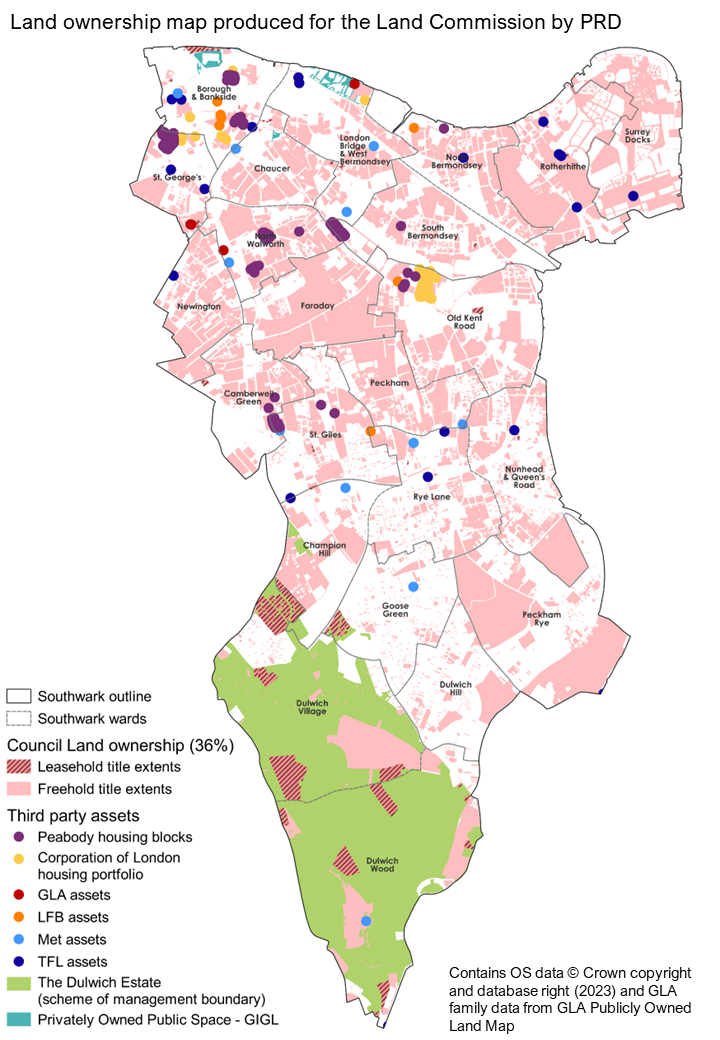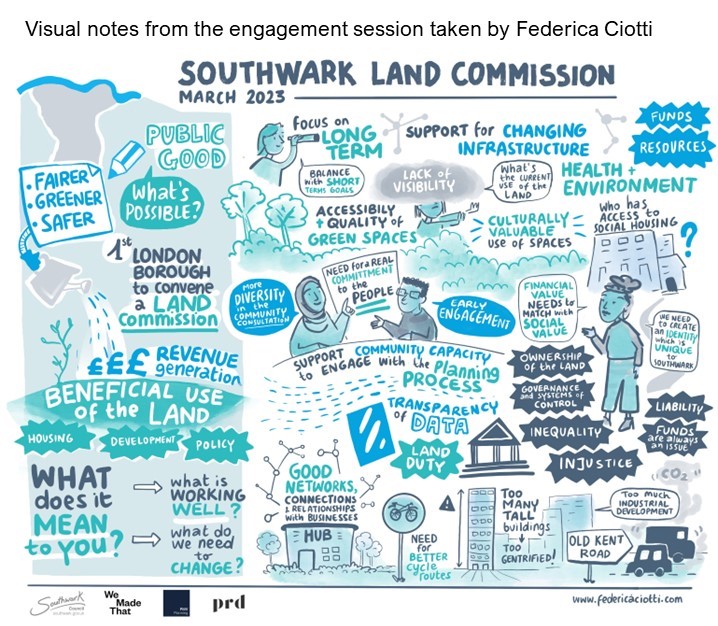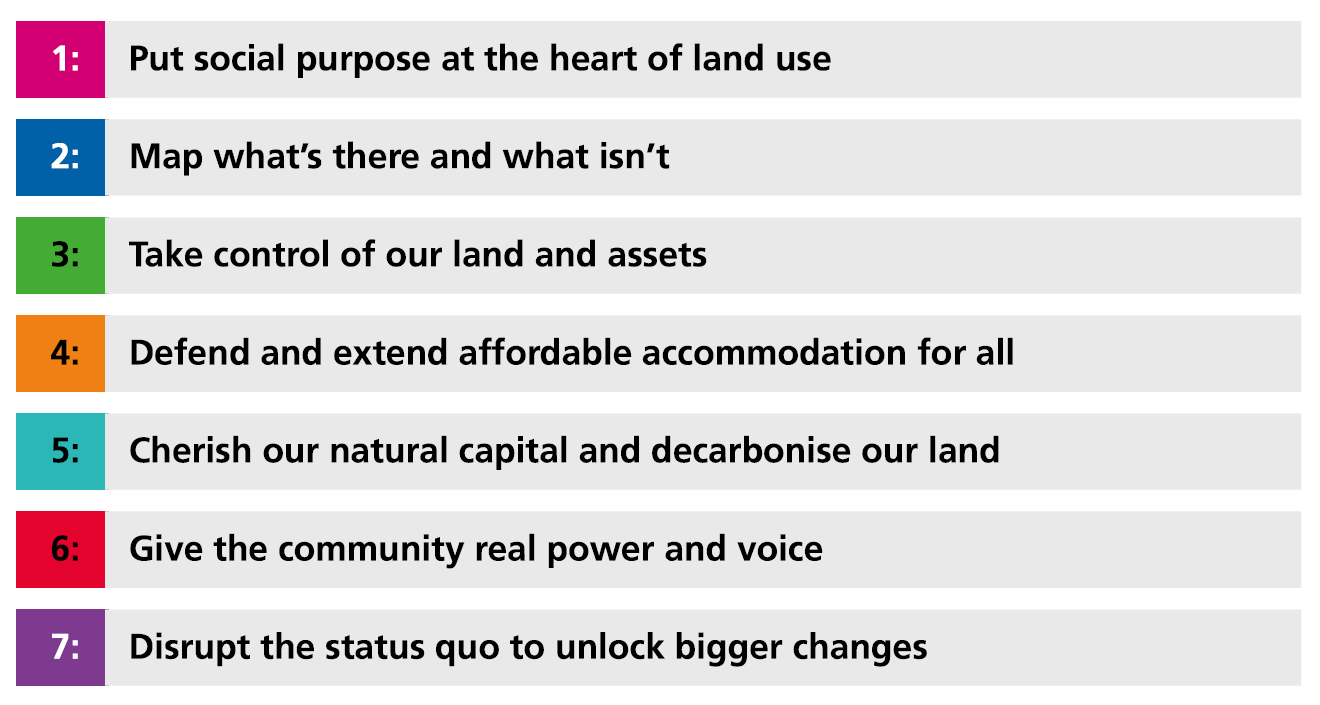Democratising land for public good: reflections from the Southwark Land Commission
Acting on a key commitment within the Council’s Delivery Plan, Southwark Council established the Southwark Land Commission in September 2022, which was the first of its kind in London. Southwark Council asked PRD and We Made That to support the management and evidence for the Commission. Malavika Krishnan explains the process and how we supported this.
The Southwark Land Commission was the first of its kind in London. It brought together a diverse and representative group of people, from landowners, members of Southwark’s civil society and leading thinkers and experts on the subject to serve as Members of the Commission. Members came together to collectively think about land and to critically look at what needs to change to deliver more ‘public good’ from land use.
The Commission’s process
Dr Miatta Fahnbulleh, Chief Executive of the New Economics Foundation, chaired the Commission and Cllr. James McAsh, Cabinet Member for the Climate Emergency and Sustainable Development, served as Vice-Chair. Read more about the Commission and its members here.
The Land Commission met formally on four occasions over an intensive six-month period: Firstly, to review challenges and existing evidence; secondly, to reflect on the insights and views sourced from community groups and individuals reached via a parallel engagement programme; then thirdly, to identify opportunities to act and to draft initial recommendations; and finally, to refine these proposals and prioritise recommended actions.
Each meeting of the Commission was curated to make efficient use of the time available, with PRD ensuring the Commission members were presented with enough evidence in the form of briefing papers, insights, and precedents to guide the discussions, and a selection of example pilot sites (selected by the council’s planning department) to think about practical considerations.
The members also met in smaller working groups between meetings three and four to fine-tune emerging recommendations and agree on the actions proposed.

Engaging communities and stakeholders
The process was also enriched through a community engagement programme to understand and test ideas and actions. This included:
- Area-based workshops: We Made That led four workshops in different parts of the borough with community groups and representatives, focussed on listening to community representatives about what they value, how they use land and their expectations from the Commission’s recommendations.
- Targeted sessions: To reach under-represented groups who have traditionally faced greater exclusion from decisions about land use, Commission Members and consultant team members attended meetings of the Southwark Youth Parliament and the Southwark Black Parents Forum.
- Feedback workshops on emerging recommendations: On formulating the draft recommendations, the Commission went back to the previous attendees for reflections on the proposed recommendations, and we incorporated feedback from these sessions into the final version.
- One-to-one discussions with stakeholders: PRD also carried out various discussions with representatives of different council departments and external representatives including major landowners in Southwark. The purpose of this engagement was to hear their perspectives on the challenges pertaining to land and land use, learn their aspirations for the land Commission and explore opportunities to collaborate and act.
The engagement approach aimed to ensure the recommendations clearly addressed the issues facing communities and their needs, creating better transparency, deeper insights, and a granular understanding of the current challenges.
As noted above, a key focus was to include the less-heard voices in the process by reaching out to representatives who worked with the communities directly and bringing participants from under-represented groups to the forefront of discussions. However, we acknowledge the limitations of engagement, in a relatively short time frame, with groups who have traditionally faced the greatest exclusion from decisions about land and assets. It will be critical that ongoing local conversations form part of longer-term action.
Furthermore, engagement with stakeholders with influence over land and asset use, both within the council and beyond, was essential to ensure that the identified opportunities to act would be practical and actionable, both for the council and wider landowners in Southwark.

The recommendations of the Southwark Land Commission: Land for Good
The Commission sets out a series of recommendations to “identify how more land in Southwark can be freed up for public good”.
These recommendations came as a result of careful consideration, detailed deliberation and discussion throughout the process. They were underpinned by the following guiding principles, which are rooted in maximising social purpose and securing long-term environmental sustainability.

The Commission alighted on seven key recommendations.
Our top recommendation is to put social purpose at the heart of land use, namely through a Social Purpose of Land Framework, which would provide a radical new approach to assess the value of land, co-produced with Southwark’s diverse communities. The idea of ‘social purpose of land’ balances the creation of social goods or community benefit against the generation of commercial income from land.

Recommendations three and six— ‘take control of our land and assets’ and ‘give the community real power and voice’—recognise the need to give communities more power over land and property, acknowledging that in many cases, capacity building and support will be needed to make this happen.
The Commission acknowledged the lack of information on ownership and control, which makes it difficult to gain greater community control over land. Recommendation two is to map what’s there and what isn’t, drawing on the report’s evidence base and creating tools to support a comprehensive open access map with information on ownership, and land use plans for future development.
Recommendation four demands that we defend and extend affordable accommodation for all, from affordability in housing to workspaces to community use to open spaces. Recommendation five, ‘cherish our natural capital and decarbonise our land’, focuses on the climate emergency, going beyond emissions to articulate the need to protect natural capital, showing greater respect for the planetary boundaries we currently overshoot.
Finally, we need to disrupt the status quo to unlock bigger changes at the regional and national levels. Truly transformational change will need a permanent and systemic shift towards greater fairness, transparency, and usefulness of land, addressing the barriers imposed upon Southwark by an unfair market and outdated government policy.
You can read the full list of recommendations alongside the priority actions in the Land for Good report, available on Southwark Council’s website.
What happens next?
The Commission recognises the immense challenge of realising these recommendations.
The Southwark Land Commission is a starting point and has served as a catalyst to support more radical change. No single organisation or institution can implement these recommendations alone; it will take time and continued effort. Landowners, stakeholders, and communities will have to work together to unlock more opportunities for influence and positive change regarding the way we perceive, use and own land.
Southwark Council has acknowledged its important role as both a significant landowner in the borough and a leader of change. As such, Southwark Cabinet will formally consider the Commission’s report and recommendations, and an official response from the council is expected early in the new year.
– By Malavika Krishnan. Please contact us if you would like to learn more about our work on the Land Commission and its recommendations.